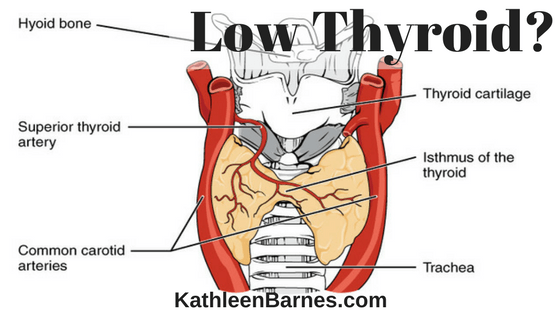Hypothyroidism seems to be running rampant these days. It’s particularly common in women over 50 who have entered perimenopause or are even fully menopausal when changing hormones can also trigger thyroid problems.
But hypothyroidism is almost always connected with low iodine intake, regardless of age or sex.
Here’s a brief overview of the problem:
Low iodine intake and absorption are the primary underlying causes of low thyroid function since the thyroid gland is driven by iodine. The incidence of hypothyroidism has increase by fourfold over the past four decades and research says that almost 74% of otherwise “healthy” adults do not consume enough iodine.
Why is that? We eat iodized salt, don’t we?
First of all iodized salt is the white bread of the mineral world. It contains sodium, chloride and a miniscule amount of iodine (just enough to prevent goiter, an extreme iodine deficiency) that evaporates off within weeks of opening the container. We need unrefined sea salt, a mineral wealth that covers all the bases and does not cause a sodium imbalance.
But I digress. What does all of this have to do with iodine? The dramatic 40-year increase offers the key: It was exactly 40 years ago that food manufacturers replaced iodine in flours with bromine.
Here’s the simple bottom line: Iodine is essential for the function of virtually every one of the trillions of cells in the human body. Bromine is toxic and blocks your body of using the iodine it gets. Chlorine and its ubiquitous use on municipal water have much the same effect.
Very few of us are getting enough iodine, leaving us open to thyroid problems and a host of other health problems, including obesity, fibrocystic breast and even breast cancer.
What can you do to improve your iodine intake and absorption?
Here’s a little list:
- Avoid all flour products. I know, easier said than done, but probably a wise health choice for a broad variety of reasons. Virtually all US manufactured baked goods are made with brominated flour. Two other solutions: Buy only products made in the European Union, Canada, Brazil and a handful of other countries that ban bromine (potassium bromate) in flours. Or, if you still want to eat flour products, bake your own. The only flours I know of are those sold under the King Arthur brand.
- Add unrefined seat salt to your diet. The pinkish brown color indicates it contains all the minerals you need.
Increase your food intake of iodine: Saltwater fish, shellfish, seaweed products, eggs legumes and dairy products are good sources of iodine, but there are numerous other foods that will help you get your iodine intake to the 12.5 mg if iodine that is the bare minimum for thyroid health.
Here’s an excerpt from my book, Food Is Medicine: 101 Prescriptions from the Garden that gives you a list of common foods that boost iodine intake and can help relieve low thyroid function.
HYPOTHYROIDISM (Low Thyroid Function)
Your Garden Rx: strawberries, asparagus, garlic, spinach, pumpkin seeds, walnuts, pecans
Hypothyroidism means your thyroid gland is not producing enough hormones to properly regulate your metabolism.
Hypothyroidism has a dozen or more symptoms including fatigue, weight gain, dry hair, brittle fingernails, sensitivity to cold, absence of outer third of eyebrows, carpal tunnel syndrome, constipation, and more. Low thyroid function has become increasingly common among perimenopausal women, with an estimated 30% or more having low thyroid function by the time they reach menopause.
Hypothyroidism is usually treated with replacement thyroid hormones. Although natural hormones have been in use for more than fifty years, doctors seem to be more reliant on synthetic thyroid hormone replacement, which can actually increase the symptoms that may have driven you to the doctor in the first place.
Since the thyroid is dependent on iodine to manufacture hormones, insufficient iodine intake can be an important factor in the disease.
Your Garden to the Rescue
Asparagus, strawberries, garlic and spinach are all excellent sources of thyroid-healthy iodine.
Pumpkin seeds are rich in tyrosine, an amino acid that combines with iodine to help your body make thyroid hormones.
Finally, selenium helps convert the plentiful T4 thyroid hormone thyroxine produced by your body into usable T3 (triiodothyronine), the more potent and usable form of thyroid hormones. Find it in abundance in all kinds of nuts, especially the walnuts or pecans you can grow in many parts of North America.







